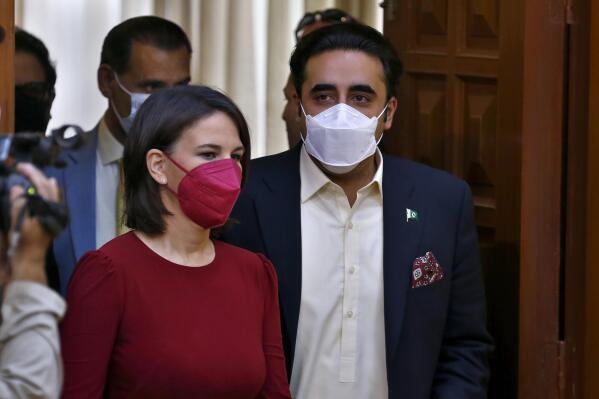Top German diplomat: Taliban to cause Afghanistan’s downfall
ISLAMABAD (AP) — Germany’s top diplomat expressed concerns Tuesday during a visit to Pakistan that neighboring Afghanistan’s new Taliban rulers are leading that country into a complete “downfall” and bringing about incredible suffering and hunger.
Annalena Baerbock spoke at a press conference with her Pakistani counterpart, Bilawal Bhutto Zardari, after discussing a range of issues with officials in Islamabad, including Russia’s invasion of Ukraine.
Since seizin power in mid-August last year, the Taliban have imposed harsh edicts in Afghanistan, harking back to their repressive rule during the late 1990s. They have restricted freedoms and rights of women, who are now barred from going to school beyond the sixth grade, and minorities. The country has plunged into an unprecedented crisis, hurtling toward an economic meltdown as famine and hunger loom.
In Islamabad, Baerbock urged that any economic aid to Afghanistan’s Taliban should be coupled with improvements in the human rights situation.
The Taliban, she said, are “leading the country into a downfall” and Afghan “parents do not know how to feed their children. Girls are deprived of their right to education. Women are almost excluded from participation in public life. Dissenting voices are brutally suppressed. The economy is grinding to a halt.”
The Taliban are “heading in the wrong direction,” Baerbock said. “As long as they go down this path, there is no room for normalization and even less for recognition of the Taliban as the legitimate rulers of the country.”
Last week, the U.N. Security Council called on Afghanistan’s Taliban rulers to “swiftly reverse” their policies and practices restricting the human rights of women and girls.
Baerbock said Germany would continue helping those Afghans who wish to leave their country and praised Pakistan for facilitating their travel to Germany.
“We will continue to provide humanitarian aid and support the people who need it the most, especially women and girls who suffer more than anyone else under the Taliban’s rule,” she said.
So far, more than 14,000 Afghans who were at risk from the Taliban had traveled to Germany through Pakistan, seeking to start a new life in safety and without fear.
Later on Tuesday, Germany’s foreign ministry said Baerbock was cutting short her trip after testing positive for COVID-19 in Pakistan. She took a test after noticing she had lost her sense of taste at lunch, the ministry said on Twitter.
It said that all further engagements on her trip were canceled, but didn’t immediately give details on the timing of her return to Germany. Bhutto Zardari and those Pakistani officials who met with the German foreign minister were protectively isolating themselves at home, according to officials.
Bhutto Zardari, standing next to his German counterpart, asked the Taliban rulers to honor the commitments they had made to the international community before and after seizing power. “It is our hope that the Afghan authorities would be responsive to the international community’s expectations regarding inclusivity, respect for human rights for all Afghans, including women, and take effective actions against terrorism,” he said.
Bhutto Zardari said the international community must be actively engaged with Afghanistan’s rulers to prevent a humanitarian crisis. “We also believe that the release of Afghanistan’s financial assets would be crucial in stabilizing the economy and giving it sustainability,” he said.
Since the Taliban seized power in August, Pakistan has been urging the United States and other countries to release upward of $10 billion in frozen Afghan assets. However, the U.S. has previously said some of that money is tied up in litigation involving the survivors and the families of victims of the 9/11 terrorist attacks carried out by al-Qaida while the group was being harbored in Afghanistan by the Taliban during their previous rule.
___
Associated Press writer Frank Jordans in Berlin contributed to this report.







